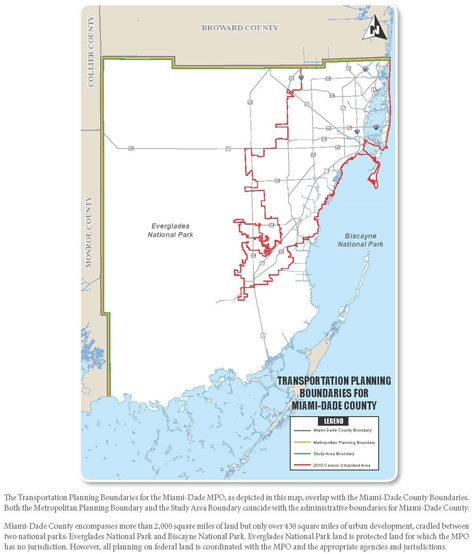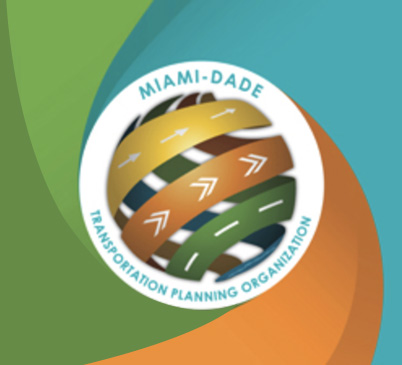Long Range Transportation Plan
The update of the Miami-Dade TPO Long Range Transportation Plan (LRTP) is a primary activity in Miami-Dade County’s transportation planning process to meet federal and state requirements for an update of the Transportation Plan every five years.
The 2050 LRTP, themed SMART M.A.P. (Mobility. Accessibility. Prosperity.) has begun and is anticipated to be adopted by the Miami-Dade TPO Governing Board in summer 2024.
The 2045 Long Range Transportation Plan (LRTP) Update marks a time of transition from the early growth and development patterns that fueled the rise of Miami-Dade County as a global hub as well as the approach to an emphasis on rapid transit, land use, densification, connectivity, multimodal mobility and innovative (non-traditional) financing throughout the long range transportation planning process.
The intent and purpose of the upcoming 2045 LRTP is to encourage, shape, promote and sustain transportation choices, economic competitiveness, the safe and efficient management, operations and development of a cost feasible intermodal transportation system that will serve the mobility needs of people and freight within the Miami-Dade urbanized area, while reducing transportation-related fuel consumption and air pollution.
In a nutshell, once the 2045 LRTP is completed, it is anticipated to reflect the community’s values and vision for improving the region’s transportation system that will foster and sustain a resilient economically competitive and prosperous world-class region.
The Miami-Dade TPO embarked on the development of the 2045 LRTP by completing work in advance to ensure compliance moving forward with the following efforts:
Federal Planning Emphasis Areas Study - The objective of this study is to address the renewed focus on transportation planning brought about the "Fixing America's Surface Transportation Act" (FAST Act) by developing process improvement recommendations to ensure that the federal PEAs are addressed in the Miami-Dade TPO’s 3-C planning process; a process that is cooperative, continuous, and comprehensive.Addressing Compliance of 2045 LRTP Update with Federal, State, Regional and Local Requirements Study - The objective of this study is to review, evaluate, and recommend new policies, programs and trends that evolved at the federal, state, regional and local levels since development of the current 2040 Long Range Transportation Plan (LRTP). Current laws applicable to LRTPs were reviewed and evaluated. New requirements have been identified and evaluated as to how they will need to be applied to the upcoming 2045 LRTP. At the Federal level, there are many factors to consider that have a direct impact on the planning process at the state and local level. Federal and State statutes outline the required elements of MPO Long Range Transportation Plans (LRTPs).
Impact of Future Technology in the 2045 LRTP - The purpose of this project is to evaluate existing and future technologies that will impact and transform the transportation planning process. It will offer the steps to incorporate technologies in the 2045 Long Range Transportation Plan (LRTP). The below documents address the question: What will our community look like in 20 - 25 years?
The 2040 Long Range Transportation Plan (LRTP) process began in the spring of 2013 and concluded in October 23, 2014 with its adoption by the TPO Governing Board. The 2040 LRTP update includes in-depth consideration of intermodal improvement opportunities, freight movement, Intelligent Transportation System technologies, and Congestion Management. Congestion management includes the implementation of strategies designed to reduce vehicle trips, shift trips from single-occupancy vehicles to high-occupancy vehicles, and maximize the effectiveness and efficiency of the existing transportation system.
A major emphasis of the 2040 LRTP is the inclusion of projects that improve the operation of the existing system. This emphasis on increasing the efficiency of the current infrastructure, in light of soaring construction costs, is embodied in the Congestion Management Process, adopted concurrently and incorporated into the LRTP.
Other emphases of this plan update involve:
- the utilization of quantitative metrics to measure the effectiveness of the plan in terms of its impact on mobility, safety, sustainability, and operational considerations;
- the consideration of non-motorized modes of transportation to promote quality of life issues for the County’s residents and visitors. They include sidewalk improvements and pedestrian and bicycle trail improvements.
- freight transportation improvements providing for improvements to the County’s economic engine to support the economic growth and prosperity of the County.

The update of the Miami-Dade County Long Range Transportation Plan to the Year 2040 is a primary activity in Miami-Dade County’s transportation planning process to meet federal and state requirements for an update of the Transportation Plan every five years. Federal law requires that the LRTP address a minimum of a 20-year planning horizon from the date of the TPO adoption. The last LRTP update, the 2035 LRTP, was approved by the Metropolitan Planning Organization (TPO) Governing Board in October 2009.
The 2040 plan update includes in-depth consideration of intermodal improvement opportunities, freight movement, Intelligent Transportation System technologies, and Congestion Management. A major emphasis of the 2040 LRTP is the inclusion of projects that improve the operation of the existing system. This emphasis on increasing the efficiency of the current infrastructure, in light of soaring construction costs, is embodied in the Congestion Management Process, adopted concurrently and incorporated into the LRTP. Congestion management includes the implementation of strategies designed to reduce vehicle trips; shift trips from single-occupancy vehicles to high-occupancy vehicles; and maximize the effectiveness and efficiency of the existing transportation system.
Other emphases of this plan update involve the utilization of quantitative metrics to measure the effectiveness of the plan in terms of its impact on mobility, safety, sustainability, and operational considerations; the consideration of non-motorized modes of transportation; and freight transportation improvements. The inclusion of non-motorized improvements in the plan promote quality of life issues for the County’s residents and visitors and include sidewalk improvements, and pedestrian and bicycle trail improvements. The plan’s dedicated section for freight transportation improvements is a critical component of the plan, providing for improvements to the County’s economic engine to support the economic growth and prosperity of the County.
Stakeholders throughout the county gave their input on future transportation priorities. The stakeholders included: residents, elected officials, advocacy groups, professional organizations, non-profits, and environmental groups.
The Public Involvement Plan reached stakeholder groups, including, but not limited to, the disadvantaged, minorities, elderly, youth, persons with disabilities, and individuals with low-income households and the Miccosukee Tribe of Indians of Florida during this process.
Public meetings held in the spring of 2014 included an opportunity to evaluate proposed improvements to the transportation system, and will also include the opportunity for participants to identify other needed improvements to be considered in the plan.
To comply with the MAP-21 and FAST Act performance management requirements, the LRTP incorporates, by reference, the FDOT Highway Safety Plan, Highway Safety Improvement Program, Freight Mobility Plan, and the FDOT Asset Management Plan. In addition, the Miami-Dade TPO Governing Board endorsed the FDOT “Vision Zero” Safety performance measure targets on January 25, 2018 through TPO Resolution #05-18.
Learn more about TPO’s Performance Management Program, including the current Transportation Performance Management System Performance Report.
2045 Documents
2040 Documents
- 2040 Long Range Transportation Plan Executive Summary, October 2014
- 2040 Long Range Transportation Plan Final Report, October 2014
- 2040 Long Range Transportation Plan: Compliance with Federal and State Requirements Study, January 2013
- 2040 LRTP: Compliance with Federal and State Requirements Presentation to the Transportation Planning Council, February 11, 2013
- Miami-Dade Moves to 2040 [LRTP] brochure, January 2013
2035 Documents
- 2035 Miami-Dade Transportation Plan Executive Summary, April 2010
- Miami-Dade 2035 Long Range Transportation Plan Final Report, October 29, 2009
- Miami-Dade 2035 Long Range Transportation Plan Presentation, October 29, 2009
- Miami-Dade 2035 LRTP Revenue and Cost Summary, November 15, 2011
- Summary of Amendments to the Miami-Dade Year 2035 Transportation Plan
